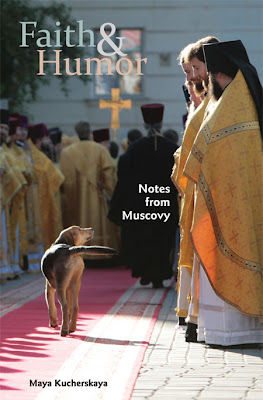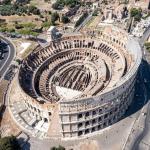 There once was a priest who had a special gift from God …
There once was a priest who had a special gift from God …
An excerpt from Faith & Humor:
Whereas elsewhere the right nave was still being fixed, the roof was already on its second year of being patched, and they were using a temporary curtain instead of a good one for the Royal Doors, our priest’s church already boasted silver domes with golden stars painted on them, and an iconostasis with sacred sixteen century icons. He even managed to have a new nave excavated and consecrated, the kind you build underground for special occasions.
While other priests were just beginning to wage a battle with their municipality in order to get a house for their deacons, our priest already had four such houses built. One he gave to his deacons, the other was used to conduct religious classes, the third had been converted to an orphanage and the fourth became a hospice for old women. Every house had antique furniture, eighteenth-century armchairs, marble floors and crystal chandeliers. He felt that while people admired the fruits of human labor, they might also think of the beauty of the Lord’s world and, sooner or later, they might even give some thought to the Creator as well.
Once he figured out what to use those houses for, our priest bought three shops, all of them of a religious nature, of course. One sold vestments, the other church literature and the third soy products, to be used during greater and lesser fasts. Once he sorted out his stores, the priest bought a stable, so that he could offer sleigh rides to visitors during church holidays, to make sure they didn’t get bored and didn’t start bickering with one another. The stable came with an amusement park. In a short order, he had a miniature Disneyland built, with Russian Orthodox saints instead of Mickey Mouse and Donald Duck.
Once he finished the Disneyland, he began building a Russian Orthodox pool, so that he could take a dip after conducting an exhausting service during Lent, or else after a horseback ride or a visit to the amusement park. When the pool was finished, he had a sauna built next to it, as well. And, given that he now had a sauna, he felt he needed a Russian Orthodox sports center. And a sports center naturally required gym equipment. With exercise equipment in place, there was a need for a Russian Orthodox hotel, complete with a conference center. That was because there was now no end of visitors from abroad, eager to learn from the priest how to run an Orthodox parish pastorally. Having had a hotel built, he really needed a Russian Orthodox airport. Once the airport was completed, and a few dozen charter flights were shuttling about, connecting it with 26 countries around the world, naturally there was a need for a small Russian Orthodox airplane of his own, as well as a modest helicopter, of course, to be able to inspect his properties and give rides to visitors.
However, if truth be told, some visitors got air sick. To accommodate those in the spirit of altruism, the priest had a small canal built, connecting the Moscow River, with special pilgrimage cruises run by a special Russian Orthodox river fleet. But traveling by water turned out to be too slow. There was nothing to be done but to build a Russian Orthodox railroad. The railroad had to be guarded against bandits and other undesirable, and so the need arose for a special Russian Orthodox Armed Forces, complete with their own gonfalons, banners, a choir, and other requisite props.
The priest eventually realized that now it was time for him to become the Russian Orthodox President. He thought it over but decided against it. If he were to become President, he would no longer have time to conduct services. After all, he was still a cleric, in the rite of Melchizedak. And so he remained a priest, having decided against becoming President (pp. 41-43).
Source











